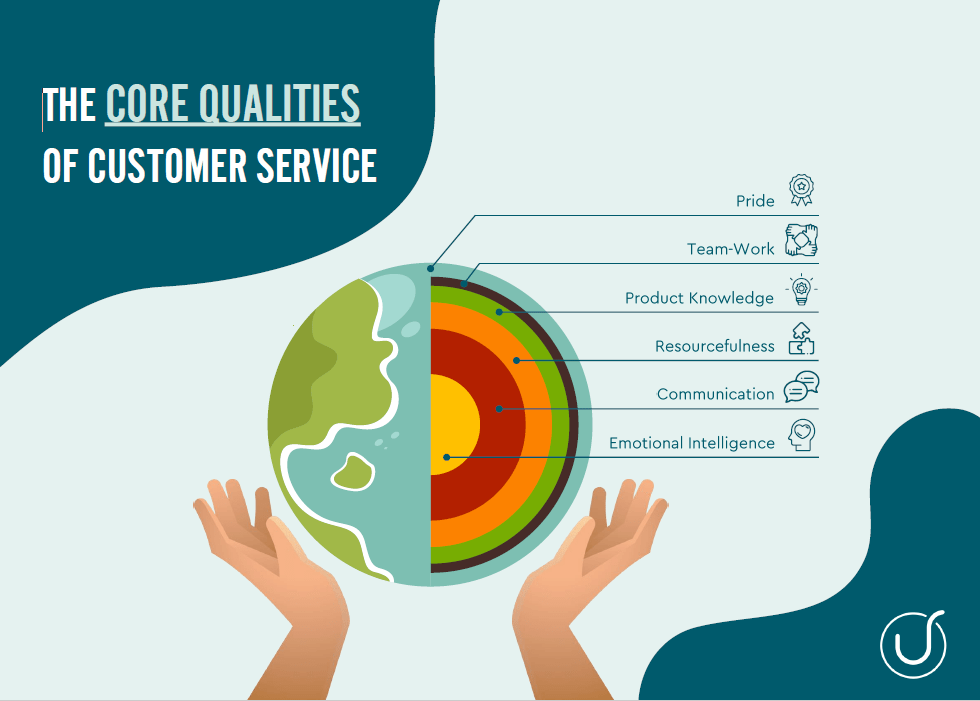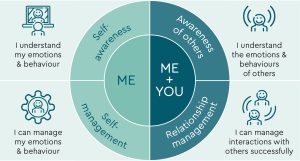
The core qualities of customer service
By Carolyn Quainton in Behaviour, Communication, Customer, Emotional Intelligence
What does it take to not just survive but truly thrive in a frontline customer service role?
Working in customer service is no walk in the park. It involves managing increasingly high expectations and handling difficult customers daily. However, when you have the right mindset and skills, this role becomes incredibly fulfilling and impactful—both for the individual and the business.
In this post, we explore six essential qualities every outstanding customer service professional needs to create a customer centric culture, enhance customer experience, and build lasting trust.

1. Emotional intelligence
“Success in dealing with people depends on a sympathetic grasp of the other person’s viewpoint.”Dale Carnegie.
Emotional intelligence in customer service plays a pivotal role in shaping the customer experience. It involves recognising, understanding, and managing emotions—both your own and those of others.
By developing emotional intelligence, you can:
Become more self-aware and recognise how you come across
Read and empathise with customers more effectively
Anticipate and respond to customers’ emotional needs
Defuse tension and manage conflict calmly
Handle pressure with resilience
Demonstrate greater patience and understanding

Customer empathy training can further sharpen your ability to connect on a human level, which is key to building customer trust and rapport.
2. Communication
“The single biggest problem in communication is the illusion that it has taken place.” George Bernard Shaw.
‘Good communication skills’ is an ability to share information effectively – allowing us to understand and to be understood by others.
We communicate in two main ways: 1) Non-verbally (body language); 2) Verbally (words).
Generally speaking, if we’ve got high levels of EQ (emotional intelligence) we’ll be good at communicating. We’ll have greater awareness of how we come across, and how we should adapt our communication style to meet the other person’s needs.
Being a good communicator helps you to:
- Understand and share information effectively
- Build trust and rapport
- Become a better listener
- Handle conflict
- Be more productive
- Influence others
3. Resourcefulness
“The defining factor of success is never resources; it’s resourcefulness.” Anthony Robbins.
When unexpected problems arise, resourceful customer service employees step up. They use initiative, adapt quickly, and find smart solutions, often going beyond the script.
Resourcefulness enables you to:
Solve problems with creativity and speed
Anticipate customer needs before they escalate
Reduce the risk of complaints
Stay composed in unpredictable scenarios
Take ownership of the customer journey
Deliver a seamless, satisfying experience
In customer service training programs, resourcefulness links closely with frontline customer service skills and helps lay the groundwork for effective upselling and cross selling.
4. Product knowledge
“Real knowledge is to know the extent of one’s ignorance.” Confucius.
Product knowledge fuels confidence and credibility. You can’t provide excellent service, or close sales, without understanding the features, benefits, and limitations of your offering.
Deep product understanding allows you to:
Communicate with clarity and confidence
Respond to objections with informed answers
Offer relevant solutions to customer needs
Identify upselling and cross selling opportunities
Improve operational efficiency
Product knowledge must stay up to date. It forms a vital pillar in customer service training programs and strengthens sales techniques for closing deals.
5. Teamwork
“If everyone is moving forward together, then success takes care of itself.” Henry Ford.
No customer service experience exists in a vacuum. Behind every positive interaction is a team working in sync. Building a customer centric culture depends on collaborative, supportive teams.
Effective teamwork helps you to:
Solve customer issues more efficiently
Share best practices and feedback
Create a cohesive service experience
Support each other emotionally and practically
Deliver consistent and reliable outcomes
A strong team underpins successful customer journey mapping and ensures a joined-up customer experience across every touchpoint.
6. Pride
“Take pride in what you do. The kind of pride I’m talking about is not the arrogant puffed-up kind; it’s just the whole idea of caring – fiercely caring.” Red Auerbach.
Taking pride in your role reflects a deep commitment to service excellence. When you genuinely care about your work, it shows, and customers notice.
Demonstrating pride helps you to:
Present yourself professionally
Exceed expectations by going the extra mile
Boost your personal and team reputation
Strengthen your organisation’s brand
Deliver experiences that improve customer retention
Pride fuels employee engagement, enhances customer feedback systems, and inspires a culture of continuous customer experience innovation.
What do you think?
Do your customer-facing teams demonstrate these six core qualities?
If you’re looking to improve customer retention, elevate customer experience management, or implement effective customer service training programs, we can help.
Talk to us, explore our website, read our blog, and follow us on LinkedIn to learn more and discover ways to grow a more successful business.


